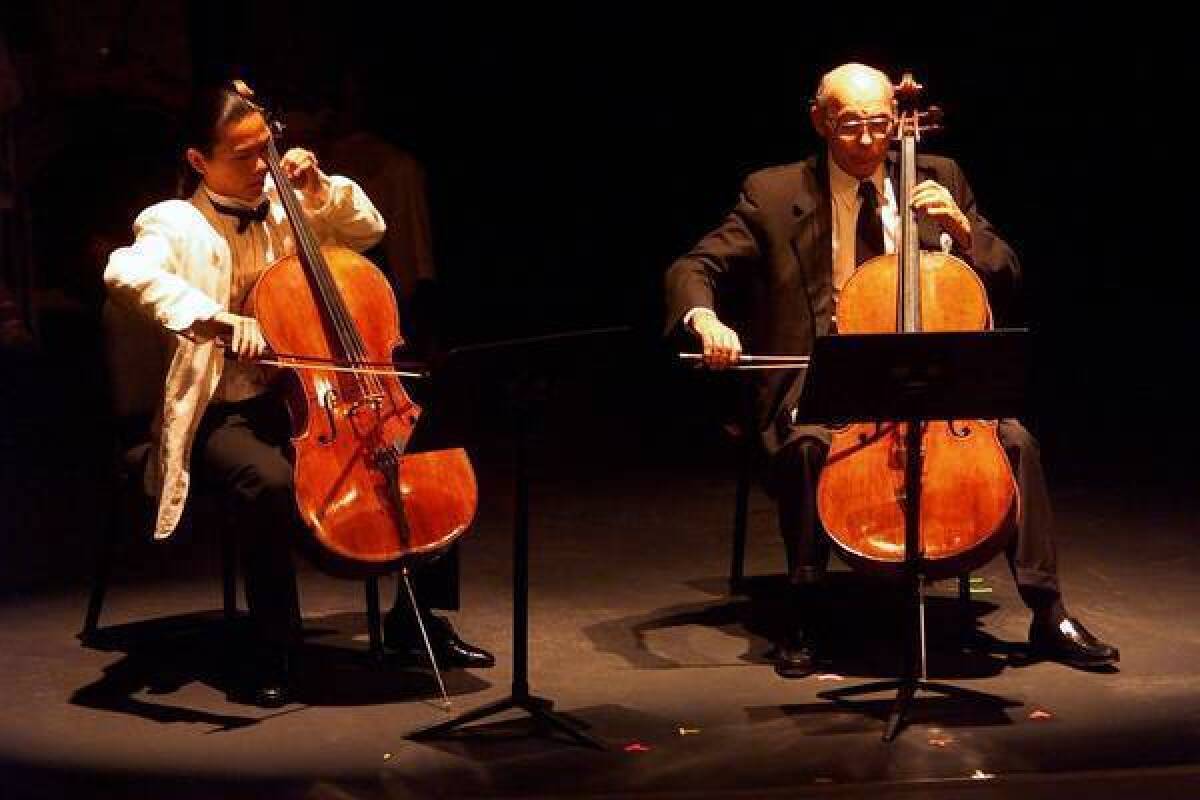Janos Starker dies at 88; renowned cellist won a Grammy in 1997

- Share via
Janos Starker, a renowned concert cellist as well as a distinguished teacher and recording artist, died Sunday at his home in Bloomington, Ind. He was 88 and had been in declining health.
Since 1958, Starker had been a professor at the Indiana University Jacobs School of Music. The university announced his death.
Starker’s cello seminars attracted students from all over the world.
“I personally cannot perform without teaching, and I cannot teach without performing,” he told the Chicago Tribune in 1993. “When you have to explain what you are doing, you discover what you are really doing.”
Born July 5, 1924, in Budapest, Hungary, Starker had been a child prodigy, giving his first public performance at age 6. At 7 he began studying cello with Adolf Cziffer at the Budapest Academy of Music and at 8 he was teaching other children. He made his solo debut at the academy at the age of 11. By the time he was 15, he was principal cellist of the Budapest Opera.
In 1945, as World War II neared its end, the 21-year-old virtuoso was sent to a German detention camp; he expected the next stop to be an extermination center. He managed to survive, but his two brothers were killed when American bombs accidentally hit the camp.
He left Hungary in 1946 and reached the United States in 1948. He served as principal cello for the Dallas Symphony and then the Metropolitan Opera before joining the Chicago Symphony Orchestra in 1953. He played principal cello there for five seasons.
“Although less fiery and never a superstar, Janos Starker was, in many ways, the Jascha Heifetz of the cello,” Los Angeles Times music critic Mark Swed said Sunday. “His technique was impeccable and he produced an invariably refined sound. And yet he had depth of tone, an ability to give every note grave substance, which made him one of the rare musicians to find a way for beauty, grace and intensity to coexist, as if we lived in a world where they were all the same thing.”
Even after he began his teaching career, Starker kept performing, touring and recording. His recording of Bach cello suites earned a 1997 Grammy Award for best instrumental solo performance.
Chicago Tribune music critic John von Rhein wrote in 1993 that all Starker “has to do is touch bow to strings, and out pours an intensity of sound that immediately takes hold of one’s senses. And the spell is cast entirely through the music, for Starker in performance maintains a grave facial expression and little eye contact with his audience.
“It’s as if he were telling us, ‘Listen to what the music is saying; don’t watch me.’ We listen, we listen.”
Starker is survived by his wife, Rae, daughters Gwen Starker Preucil and Gabriella Starker-Saxe and three grandchildren.
More to Read
Start your day right
Sign up for Essential California for the L.A. Times biggest news, features and recommendations in your inbox six days a week.
You may occasionally receive promotional content from the Los Angeles Times.







